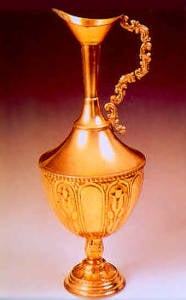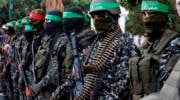
By Rabbi Ari Enkin, rabbinic director, United with Israel
We already discussed the issue of animal sacrifice versus grain offerings when the Holy Temple will be rebuilt in Jerusalem. In this column, more insight is offered on this rabbinic debate.
After the destruction of the Holy Temple, and by extension, the cessation of sacrifices, Judaism was forced to undergo a significant restructuring. No longer could the faith revolve around the Temple and its services. A new focus was needed. This led to the development of the religion to focus on study, prayer and observance.
In the words of the Talmud and Midrash (Rabbinic literature):
“Rabbi Yohanan ben Zakkai was once walking with his disciple, Rabbi Yehoshua, near Jerusalem after the destruction of the Temple. Rabbi Yehoshua looked at the Temple ruins and said. ‘Alas for us!! The place that atoned for the sins of the people Israel lies in ruins!’ Then Rabbi Yohannan ben Zakkai spoke to him these words of comfort: ‘Be not grieved, my son. There is another equally meritorious way of gaining ritual atonement, even though the Temple is destroyed. We can still gain ritual atonement through acts of loving kindness. For it is written Loving kindness I desire, not sacrifice.'” (Midrash Avot D’rabbi Natan 4:5)
Rabbi Elazar said: “Doing charity and justice is more desirable to the Lord than sacrifice.” (Talmud, Sukkah 49)
Nevertheless, Judaism stresses the importance of, and hope for, the rebuilding of the Holy Temple and the eventual reintroduction of sacrifices. As the Talmud says:
“And I said to him: I heard a heavenly voice that was cooing like a dove and saying, ‘Woe to the children because of whose sins I destroyed My house, and burned My temple, and exiled them among the nations of the world.’ And he [Elijah the prophet] said to me: ‘By your life and the life of your head! It is not only at this moment that the heavenly voice says this. But on each and every day it says this three times! And not only this, but when the people of Israel enter the synagogues and houses of study, and recite in prayer, May His great name be blessed, the Holy One, Blessed is He, shakes His head and says: Fortunate for the king who is praised this way in his house. What is there for the Father who has exiled His children. And woe to the children who have been exiled from their Father’s table [the altar].'” (Talmud Berachot 3a)
Rebuilding the Temple: A Central Theme
Jewish liturgy is filled with references to the Holy Temple and prayers for its rebuilding. For example, the Shemone Esrei prayer, recited at least three times a day, includes the following:
“Be favorable, Lord our God, to your people Israel and their prayer, and restore the service to your House, and accept the offerings of Israel, and their prayers, with love and favor, and may the service of your people Israel always be favored.”

Pitcher is used to replenish the oil for the menorah. The design is based on an ancient coin from the Second Temple period. (templeinstitute.org)
So too, the end of every Shemone Esrei includes a prayer for the rebuilding of the Temple and the return of sacrifices. On Shabbat and holidays there is an additional service, Mussaf, that is recited. Mussaf focuses entirely on the Temple service and includes a description on the sacrifices that were offered on that particular day. There are countless other passages in the prayers that refer to the Temple and Temple service.
Although Judaism teaches that there will be a third Temple in the Messianic era, there is much discussion on what kind of service will be performed there and when the practice of animal sacrifice will return. A number of rabbinic sources maintain that animal sacrifice will not return in the Messianic era.
For example:
“In the future all sacrifices, with the exception of the Thanksgiving sacrifice, will be discontinued.” (Midrash Vayikra Rabbah 9:7)
“All sacrifices will be annulled in the future.” (Tanchuma Emor 14, Vayikra Rabbah 9:7)
“Then the grain-offering of Judah and Jerusalem will be pleasing to God as in the days of old, and as in ancient years.” (Malachi 3:4)
Nevertheless, the majority of rabbis maintain that animal sacrifice will resume to some extent in the third Temple. In the 1800s a number of Orthodox rabbis examined the idea of reinstating animal sacrifice on the Temple Mount. The conclusion of most rabbis was that many sacrifices could indeed be offered on the Temple Mount even in the absence of a functioning Temple.
In the early 20th century, Rabbi Yisrael Meir Kagan, known as the Chafetz Chaim, encouraged the extensive study of matters relating to sacrifices in order to prepare for the imminent arrival of the Messiah and the resumption of Temple service. Due to his influence, there are yeshivot (talmudic seminaries) in Israel that focus solely on studying matters related to the Holy Temple. In fact, the Temple Institute in Jerusalem has been constructing all the ritual objects and vessels that will be needed for the third Temple.
To read the previous article on this topic, click HERE.
Do You Love Israel? Make a Donation - Show Your Support!
Donate to vital charities that help protect Israeli citizens and inspire millions around the world to support Israel too!
Now more than ever, Israel needs your help to fight and win the war -- including on the battlefield of public opinion.
Antisemitism, anti-Israel bias and boycotts are out of control. Israel's enemies are inciting terror and violence against innocent Israelis and Jews around the world. Help us fight back!






















